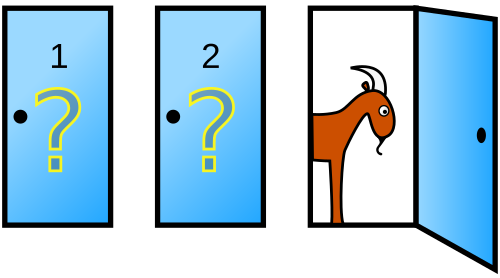The Monty Hall problem is a probability puzzle based on the American television game show Let's Make a Deal. The name comes from the show's host, Monty Hall. The problem is also called the Monty Hall paradox, as it is a veridical paradox in that the result appears absurd but is demonstrably true.
A well-known statement of the problem was published in Parade magazine:
Suppose you're on a game show, and you're given the choice of three doors: Behind one door is a car; behind the others, goats. You pick a door, say No. 1, and the host, who knows what's behind the doors, opens another door, say No. 3, which has a goat. He then says to you, "Do you want to pick door No. 2?" Is it to your advantage to switch your choice? (Whitaker 1990)
As the player cannot be certain which of the two remaining unopened doors is the winning door, most people assume that each of these doors has an equal probability and conclude that switching does not matter. In fact, in the usual interpretation of the problem the player should switch—doing so doubles the probability of winning the car, from 1/3 to 2/3.
When the above statement of the problem and the solution appeared in Parade, approximately 10,000 readers, including nearly 1,000 with PhDs, wrote to the magazine claiming the published solution was wrong. Some critics pointed out that the Parade version of the problem leaves certain aspects of the host's behavior unstated, for example, whether the host must open a door and must make the offer to switch. However, such possible behaviors had little or nothing to do with the controversy that arose (vos Savant 1990), and the intended behavior was clearly implied by the author (Seymann 1991). More general interpretations of the problem in which, for example, the host may sometimes reveal the car, have been discussed in mathematical literature.
The Monty Hall problem, in one of its common formulations, is mathematically equivalent to the earlier Three Prisoners problem, and both bear some similarity to the much older Bertrand's box paradox. These and other problems involving unequal distributions of probability are notoriously difficult for people to solve correctly, and have led to numerous psychological studies that address how the problems are perceived. Even when given a completely unambiguous statement of the Monty Hall problem, explanations, simulations, and formal mathematical proofs, many people still meet the correct answer with disbelief.
http://en.wikipedia.org/wiki/Monty_Hall_problem
